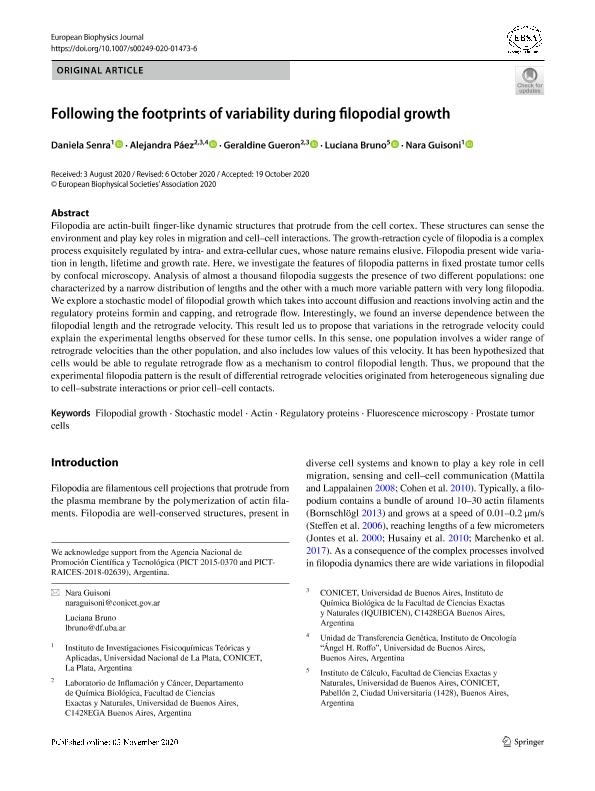Artículo
Following the footprints of variability during filopodial growth
Fecha de publicación:
11/2020
Editorial:
Springer
Revista:
European Biophysics Journal With Biophysics Letters
ISSN:
0175-7571
Idioma:
Inglés
Tipo de recurso:
Artículo publicado
Clasificación temática:
Resumen
Filopodia are actin-built finger-like dynamic structures that protrude from the cell cortex. These structures can sense the environment and play key roles in migration and cell–cell interactions. The growth-retraction cycle of filopodia is a complex process exquisitely regulated by intra- and extra-cellular cues, whose nature remains elusive. Filopodia present wide variation in length, lifetime and growth rate. Here, we investigate the features of filopodia patterns in fixed prostate tumor cells by confocal microscopy. Analysis of almost a thousand filopodia suggests the presence of two different populations: one characterized by a narrow distribution of lengths and the other with a much more variable pattern with very long filopodia. We explore a stochastic model of filopodial growth which takes into account diffusion and reactions involving actin and the regulatory proteins formin and capping, and retrograde flow. Interestingly, we found an inverse dependence between the filopodial length and the retrograde velocity. This result led us to propose that variations in the retrograde velocity could explain the experimental lengths observed for these tumor cells. In this sense, one population involves a wider range of retrograde velocities than the other population, and also includes low values of this velocity. It has been hypothesized that cells would be able to regulate retrograde flow as a mechanism to control filopodial length. Thus, we propound that the experimental filopodia pattern is the result of differential retrograde velocities originated from heterogeneous signaling due to cell–substrate interactions or prior cell–cell contacts.
Archivos asociados
Licencia
Identificadores
Colecciones
Articulos (IC)
Articulos de INSTITUTO DE CALCULO
Articulos de INSTITUTO DE CALCULO
Articulos(INIFTA)
Articulos de INST.DE INV.FISICOQUIMICAS TEORICAS Y APLIC.
Articulos de INST.DE INV.FISICOQUIMICAS TEORICAS Y APLIC.
Articulos(IQUIBICEN)
Articulos de INSTITUTO DE QUIMICA BIOLOGICA DE LA FACULTAD DE CS. EXACTAS Y NATURALES
Articulos de INSTITUTO DE QUIMICA BIOLOGICA DE LA FACULTAD DE CS. EXACTAS Y NATURALES
Citación
Senra, Daniela; Paez, Alejandra; Gueron, Geraldine; Bruno, Luciana; Guisoni, Nara Cristina; Following the footprints of variability during filopodial growth; Springer; European Biophysics Journal With Biophysics Letters; 49; 7; 11-2020; 643-659
Compartir
Altmétricas




